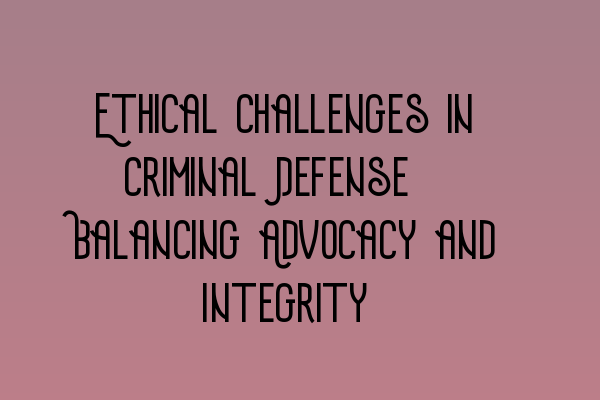Ethical Challenges in Criminal Defense: Balancing Advocacy and Integrity
When it comes to criminal defense, lawyers face a multitude of ethical challenges. As advocates for their clients, they are tasked with protecting their clients’ rights, ensuring fair treatment, and obtaining the best possible outcome. However, lawyers must also navigate the delicate balance between zealous advocacy and maintaining their own integrity. In this article, we will explore some of the ethical challenges faced by criminal defense lawyers and how they can navigate these challenges with professionalism and ethics.
The Duty of Loyalty
One of the main ethical challenges for criminal defense lawyers is the duty of loyalty to their clients. Lawyers must provide undivided loyalty and zealously advocate for their clients’ interests. However, this duty of loyalty can sometimes conflict with the lawyer’s personal ethical beliefs or the broader interests of society.
For example, a criminal defense lawyer may be faced with representing a client they believe to be guilty. Despite their belief in the client’s guilt, the lawyer is still obligated to provide a strong defense and protect their client’s rights. This balancing act can be challenging, but it is essential to uphold the principles of justice in the legal system.
Related Article: SQE 1 Practice Exam Questions
Confidentiality and the Attorney-Client Privilege
Confidentiality is a cornerstone of the attorney-client relationship. Criminal defense lawyers must maintain the highest level of confidentiality and protect the attorney-client privilege. This means that they cannot disclose any information shared by the client without their consent.
However, this duty of confidentiality can sometimes create ethical dilemmas. For instance, if a lawyer learns that their client is planning to commit perjury, they cannot knowingly allow the false testimony. The lawyer must find a way to fulfill their duty of loyalty while still upholding their ethical responsibilities.
Related Article: SQE 1 Practice Mocks FLK1 FLK2
The Role of Truth and Integrity
Another ethical challenge faced by criminal defense lawyers is the role of truth and integrity. While lawyers are tasked with providing a zealous defense for their clients, they must also be truthful in their representations to the court. Lawyers must not make false statements or present evidence they know to be false.
This challenge is particularly relevant when it comes to negotiation and plea bargaining. Lawyers must balance their duty to obtain the best possible outcome for their client with the duty to be honest and uphold the integrity of the justice system.
Related Article: SQE 2 Preparation Courses
The Duty to the Court
Criminal defense lawyers also have a duty to the court. They must not engage in conduct that is dishonest or misleading to the court. This duty requires lawyers to present evidence truthfully and not to engage in obstruction or delay tactics.
While lawyers advocate for their clients, they must do so in a manner that respects the court and upholds the administration of justice. This ethical challenge involves striking a delicate balance between zealous advocacy and maintaining professionalism.
Related Article: SQE 1 Preparation Courses
Conclusion
Ethical challenges are an inherent part of criminal defense practice. Balancing advocacy and integrity requires criminal defense lawyers to navigate complex ethical dilemmas and make difficult decisions. Upholding the principles of justice, maintaining client confidentiality, being truthful, and respecting the court are of utmost importance.
While these challenges can be daunting, criminal defense lawyers can rely on their training, professional values, and ethical guidelines to guide their decision-making process. By consciously considering the ethical implications of their actions, lawyers can strive to achieve the delicate balance between strong advocacy and unwavering integrity.
Related Article: SRA SQE Exam Dates
